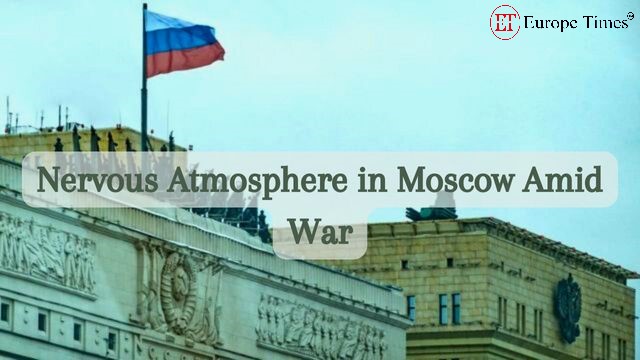Nerves and patriotism in Moscow after 18 months of war

Moscow’s atmosphere is heavily influenced by Russia’s imperial history. The imposing Kremlin walls and towers create a sense of insignificance among visitors on Red Square.
A similar feeling arises five miles away at Victory Park, a vast complex of museums and memorials honoring the Soviet Union’s triumph over Nazi Germany. Its centerpiece, a colossal square with a 141.8-meter obelisk, pays tribute to each day of World War Two.
During my visit, the National Day of the Russian Flag is celebrated, marked by the unfolding of a massive tricolor flag, reportedly the nation’s largest. Ringed by Russian soldiers, the flag unfurls to the tune of patriotic music. The museum director’s speech underscores the unifying power of such events.
In the wake of the full-scale invasion of Ukraine, the Kremlin has actively promoted such patriotic gatherings.
Inside the Victory Museum, an exhibition glorifies the “heroes” of the “special military operation,” likening Russian involvement in Ukraine to the Soviet efforts in WW2.
Andrei Afanasiev, a pro-Kremlin blogger and academic, believes that patriotism gains importance during wartime, asserting that Russia is facing a Western-led conflict that necessitates self-reliance and unity. He maintains that patriotism has surged and that the Russian people are mobilized and united by the war.
Russian state TV portrays “successes” and “progress,” but the actual situation contrasts starkly. A military analyst reveals that the Russian military acknowledges being in a tough spot, having lost territory and with morale low due to their unpreparedness for modern warfare.
The analyst indicates that information about the battlefield situation is distorted as it moves up the chain of command, including to the president.
The overall atmosphere in Moscow exudes apprehension. Recent events, such as Yevgeny Prigozhin’s mutiny and the devaluation of the ruble, contribute to a sense of unease. The city’s skyline is juxtaposed with an anti-aircraft system atop the Russian Defence Ministry, symbolizing the coexistence of beauty and apprehension.
While individuals might not be perturbed by individual occurrences, there’s a prevailing sentiment of concern about the present and fear for the future.
In Gorky Park, a picturesque scene unfolds, with families enjoying the surroundings. Nearby, the Russian Defence Ministry stands, topped by an anti-aircraft system. This contrast doesn’t alarm locals, with some expressing approval for the military stance.
Fear has taken root in Moscow. Opposition activists convene in inconspicuous spaces, with Yulia Galyamina leading the meeting. She laments the frequent arrests of activists but remains committed to her cause. Other activists, using pseudonyms due to fear, underscore the presence of anti-war sentiment in Russia and their dedication to the cause.
Despite the challenges, they believe in humanity’s ultimate triumph and vow to persevere.
Picture Courtesy: Google/images are subject to copyright
